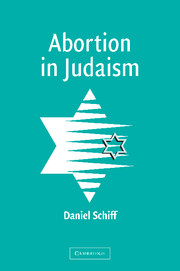Book contents
- Frontmatter
- Contents
- Preface
- 1 The conundrum takes shape: foundational verses
- 2 Evaluating life: rabbinic perspectives on fetal standing
- 3 Divining a prohibition: the positions of the Rishonim and Acharonim
- 4 No clear consensus: the sages of a rising modernity
- 5 The struggle returns: Jewish views begin to take form
- 6 Confronting a new reality: legislation for a Jewish state
- 7 A halakhic challenge: discerning Jewish abortion principles
- Glossary
- Bibliography
- Index
4 - No clear consensus: the sages of a rising modernity
Published online by Cambridge University Press: 09 November 2009
- Frontmatter
- Contents
- Preface
- 1 The conundrum takes shape: foundational verses
- 2 Evaluating life: rabbinic perspectives on fetal standing
- 3 Divining a prohibition: the positions of the Rishonim and Acharonim
- 4 No clear consensus: the sages of a rising modernity
- 5 The struggle returns: Jewish views begin to take form
- 6 Confronting a new reality: legislation for a Jewish state
- 7 A halakhic challenge: discerning Jewish abortion principles
- Glossary
- Bibliography
- Index
Summary
The halakhic statements relevant to abortion that were written during the greater part of the nineteenth century displayed no evidence whatsoever that a watershed in Jewish history was being traversed. Yet, in almost every significant area of Jewish life, that was precisely what was happening. Monumental transitions were underway. Citizenship, economic mobility, the disintegration of autonomous community, the rise of secular law, the challenge of reason to revealed religion, the development of scientific thought and of a critical study of the past – among many other factors – were all having profound and irrevocable effects upon Jews and Judaism. Eventually the impact of these unprecedented phenomena would be seen clearly in the abortion area, but the early rabbis of modernity were decidedly more engaged in the deliberations of the Acharonim than in responding to their own Zeitgeist. Despite its avowed revolutionary nature, when it came to halakhic matters that were less than pressing, modernity, it seems, called forth a slow process of percolation that eventually would culminate in altered perspectives, rather than immediate effects.
Thus it was that Rabbi Israel Lipschutz (1782–1860), who was born during the early stages of the Enlightenment and lived through the first decades of modernity, accepted the inheritance of the Rishonim and Acharonim, without displaying any apparent influences from the events of the outside world.
- Type
- Chapter
- Information
- Abortion in Judaism , pp. 95 - 132Publisher: Cambridge University PressPrint publication year: 2002



